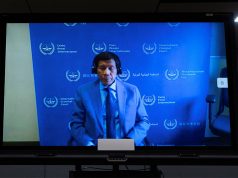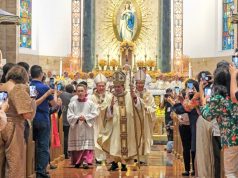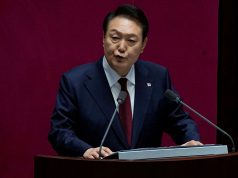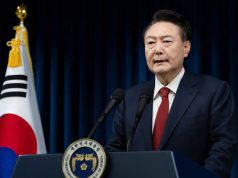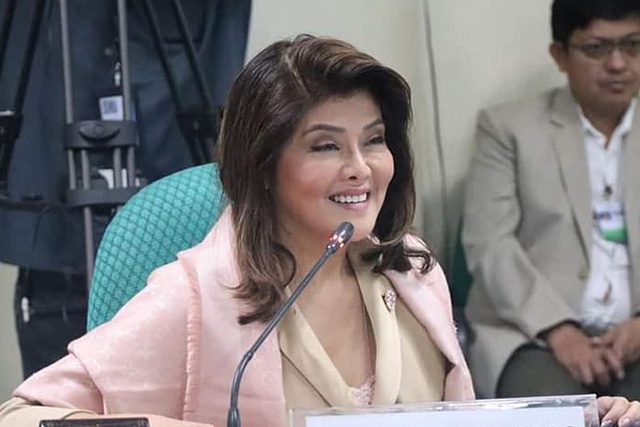
Sen. Imee Marcos once again tried to revise history when she insisted Finance Secretary Carlos Dominguez to use her late father’s “effective” rice program to supposedly assist farmers and informal settlers during the coronavirus pandemic.
At a Senate hearing meant to discuss the government’s response to the global health crisis last Wednesday, the daughter of ousted dictator Ferdinand Marcos Sr. suggested Dominguez to use the “Masagana 99” program as template to tap banks in order to help the affected Filipinos.
“During the Masagana 99 in the 70s, there was also an effective use of commercial banks, rural banks and even cooperative banks and I believe that scheme would truly work,” Marcos told the finance chief, who was the former agriculture chief of late President Corazon Aquino.
Dominguez refuted her claims and said that the rice program “bankrupted” about 800 rural banks. He added that the agricultural department had to clean up the “mess” that it made that time.
But Marcos was persistent and called the finance chief out for “giving up on Filipino farmers.”
Experts also said that the program left poor farmers largely indebted and tarnished the balance sheets of rural banks for several unpaid loans.
A senior research fellow at the Philippine Institute for Development Studies stressed it was a “failure” and called it a “fiscal disaster.”
‘Never again’
Meanwhile, Marcos’ attempt to revise history did not escape some Filipinos who claimed that it was the only thing the political family was supposedly good at.
A Twitter user shared a news item showing the video featuring the exchange between Dominguez and Marcos.
“This is why the Marcoses have to be fact-checked with everything: They’re chronic liars. Revisionists through and through,” he said.
"I was the Secretary of Agriculture who cleaned up the mess that was left by Masagana 99."
Finance Sec. Carlos Dominguez disputes Senator Imee Marcos' claim that the 'Masagana 99' a program of her father, former dictator Ferdinand Marcos, was successful.https://t.co/sJnNyWf0wI
— Philstar.com (@PhilstarNews) May 20, 2020
Another online user thanked Dominguez “for standing up and correcting” Marcos, who the user said was “doing what a Marcos does best — REVISE HISTORY.”
The online user also added the hashtag “#NeverAgain.”
Marcos previously attempted to revise history when her office issued a statement commemorating the 39th anniversary of the Research Institute for Tropical Medicine. She also highlighted her Senate Bill 1407 which aims to expand the institute.
Fact-checker VERA Files said that some statements in her bill were “inaccurate” and found to be conveying “disinformation,” as well as an attempt to “downplay” the achievements of RITM and its staff.
This also did not escape historian and blogger Kristoffer Pasion who warned Filipinos about her attempt at “historical revisionism.”
A snippet history of Research Institute for Tropical Medicine (RITM) and how Senator Imee Marcos lied about it.
Beware of historical revisionism. The devil is in the details. #COVID19PH #RITM #Marcos #History #PH https://t.co/mWyeGYGhZQ
— Kristoffer Pasion (@indiohistorian) April 25, 2020
Marcos also echoed her late father during the 34th anniversary of the EDSA People Power Revolution in February who said that history “should not be left to historians.”
Her Facebook page shared a photo quoting her father on the day that the nation was supposed to commemorate the historical moment where his 20-year regime was toppled without bloodshed.
“History should not be left to the historians. Rather, be like Churchill. Make history and then write it,” the quote said.
A Twitter user called her out and mentioned that Filipinos “shall have this history (Marcos’ regime) written down” so they will “not forget” her father’s dark reign.
Marcos has been attempting to give her family a chance to tell their side of the story during the regime.
In September last year, she urged the University of the Philippines-Diliman to teach the students all of the perspectives on Martial Law.
The university planned to offer a general subject course on Martial Law but Marcos said that her family should be given a chance to explain their story as well.
“Pagbigyan na lang lahat,” she said to reporters that time.
“Actually sa tingin ko, kasalanan din ng pamilya namin kasi naging tameme rin kami. Tinamad na kami magsalita, hindi namin binabahagi ang alam namin. ‘Di na kami nagkikwento kasi parang nakakapagod na,” Marcos added.
Martial Law during the late Ferdinand Marcos Sr.’s time is considered a dark period in the Philippine contemporary history where several violations against human rights were recorded, as well as the blatant disregard of fundamental civil liberties.




